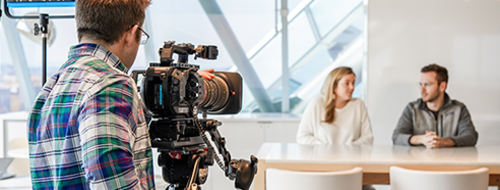If you’re paying attention to the world of sustainable packaging, you’re probably hearing the word “loop” quite often. Closing the loop on recycling means exactly what it sounds like — the process should be a contained, circular cycle. You buy your favorite brand, you enjoy the product, then you send the packaging off to be recycled – later, those same materials could be returned to you transformed into something new.
It’s a simple concept, but the execution of that concept requires real investment and effort. At Nestlé, we have shifted our mindset, viewing our carefully designed packaging as a resource that should be conserved. Nestlé’s investment in this area is significant: we’ve invested $30 million in the Closed Loop Leadership Fund to help upgrade recycling infrastructure and, alongside global corporations, joined Brookfield to collectively invest nearly a billion dollars in Closed Loop Partners’ operating company, Circular Services, the leading developer of circular economy infrastructure. These investments will bolster packaging materials collection and secure access to food-grade recycled plastics, helping to drive a circular economy.
Simply put, these efforts seek to increase recycling rates in the U.S. and keep valuable materials in the supply chain, instead of in landfills.
To do this, it’s useful to think in terms of packaging as designed for circularity – to be successful, all parts of the loop need to function to support recycling from the onset, so packaging is made with key materials that we can expect to leverage again as a resource. At Nestlé, we help to do this in three ways: designing innovative packaging, helping advance infrastructure, and advocating for a circular economy.
Designing Innovative Packaging
Recycling isn’t something we think about after we create a new product — it’s something we embed from the outset. We collaborate with packaging trade associations from the beginning of our development process, right through to working with sales teams once a product is ready for distribution. That way, packaging sustainability is really at the forefront of everyone’s minds, and we can create new packaging that is never intended for landfill. These efforts have additional benefits too; they can support local jobs, and even help us reduce energy.
We’re a food company, which means our packaging isn’t just for delivering a product to you with ease. It’s also designed to keep food fresh and safe. Our packaging teams are exploring innovative new ways to bring you great food in packaging that is food-safe and protects the environment. That work is ongoing, and our ambition is to make 100% of our packaging recyclable or reusable and reduce new virgin plastic by one third by 2025.
We’ve already made progress. For example, our 46-ounce natural bliss bottles are made from fully recycled material, meaning the whole bottle is intended to come from and re-enter the recycling loop. The bottles and cans used for all our Premium Water brands, including Perrier, San Pellegrino, Acqua Panna and Essentia, are also 100% recyclable.
Improving Infrastructure
To keep recyclable materials out of landfills, we need to improve the U.S. recycling infrastructure. The recycling system in the U.S. is fragmented, and as packaging composition has evolved, the system has not kept pace. Capabilities vary from state to state, and in many cases, town to town. It needs to be easy for consumers to recycle, and to get there, the recycling infrastructure and capabilities across the U.S. must evolve.
Our $30 million investment in the Closed Loop Leadership Fund is designed to do just that – helping support the Closed Loop Partners’ efforts to modernize recycling facilities and increase the percentage of disposed materials that are rescued from landfill and recycled. These efforts can make tangible impacts throughout the U.S. For example, Balcones Resources, a materials recovery facility in Austin, Texas, was able to install new back-end optical sorting technology made possible by an investment from the Closed Loop Leadership Fund. This technology has helped Balcones increase the volume of PET plastic it captures during the sorting process by approximately 30%.
Photo: Sims Municipal RecyclingMost recently, Closed Loop Partners acquired Sims Municipal Recycling, one of the largest privately held recycling companies in the world. The acquisition is expected to aid in further modernizing circular economy infrastructure and service in the New York-New Jersey Metro region, and to accelerate the recovery of valuable materials including plastics, paper, metal and glass.
We’ve also worked closely with the Recycling Partnership, an organization that helps communities gain access to quality recycling equipment and information. Recently, The Recycling Partnership launched The National Recycling Database and Chatbot, which helps consumers understand what is and what is not recyclable.
Advocating for a Circular Economy
Nestlé knows that to make a difference, we must do our part. We’re working hard to improve the ways we work, to innovate in the packaging space, and to find the right places to invest in to drive change. We also know we can’t do this alone, which is why we champion policies that seek to increase access to recycling, reduce leakage into the environment and reduce the use of virgin plastic.
We are working to bring together companies, social organizations, Governments and individuals, including our employees, to drive collective action and improve the recycling systems across the U.S., because we know that this collective action is crucial to realizing the long-term, sustainable impact we are all working towards.
In addition to our work with Closed Loop Partners and The Recycling Partnership, we also work with organizations such as The Ellen MacArthur Foundation, the U.S. Plastics Pact, the Association of Plastic Recyclers and many others. We’re excited to be part of bringing together collective innovation and creativity to inspire real change.
Ultimately, you should feel comfortable buying products and knowing that you can recycle packaging without worrying about sending materials to landfill. Our mission is to leave the world better than we found it. Closing the loop on packaging is a big part of doing just that.





